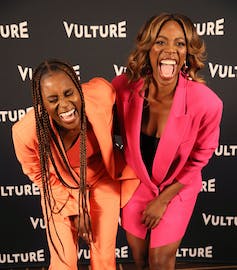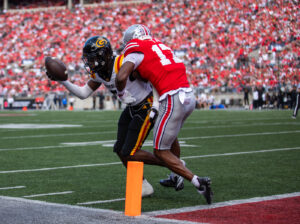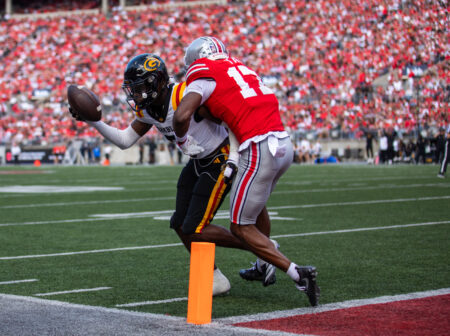by Kris Marsh, University of Maryland
Why is it seemingly OK to ask single people “Why are you single?” when married people are rarely asked “Why are you married?”
Sociologist Kris Marsh hopes to break this double-standard with her new book “The Love Jones Cohort: Single and Living Alone in the Black Middle Class.” In it, she examines the lifestyles of single people and explores the stigma that can come with their decision to not marry.
What’s the story behind the title?
My mentor and I coined the expression “The Love Jones Cohort” over coffee on a hot and humid summer day in Chapel Hill, North Carolina. We were discussing how my idea to study Black middle class men and women who are single and living alone came from both media and my own life experiences.
I said that I was noticing – in both film and TV – a demographic shift in Black characters away from married couples to single adults. I believed this started with the 1997 romance drama “Love Jones,” starring Larenz Tate as an up-and-coming poet, and Nia Long as a talented but recently unemployed photographer.
Addis Wechsler Pictures/Getty Images
The film follows the two characters, as well as their friends and acquaintances, as they pursue careers and lovers. It deals with relationships, premarital sex, choosing partners, the gender pay gap and the realization that growing old and single might affect one’s health. More than 25 years later, the film remains a staple within Black culture.
Tell us more about this shift in TV and film
In the 1980s and 1990s, the media prototype for the middle class – whether Black or white – had been a married couple with children. For the Black middle class, this was exemplified by the Huxtable family from “The Cosby Show,” a sitcom starring Bill Cosby that ran from 1984 to 1992 about an obstetrician father, a corporate attorney and their four happy, intelligent and adorable children.
After “The Cosby Show,” a surge of sitcoms and films depicted Black middle-class characters of a quite different demographic profile. These characters were 20-something, educated professionals who had never been married, were child-free and lived alone or with an unmarried friend or two. “Living Single,” a sitcom that ran from 1993 to 1998, centered on six Black friends living in a Brooklyn brownstone. “Girlfriends,” another popular sitcom, ran from 2000 to 2008 and followed the career and dating lives of four single Black women.

David Livingston/Getty Images
More recent TV shows that represent the Love Jones cohort include “Being Mary Jane,” which ran from 2013 to 2019 and was about a young Black female news anchor and her career and family, and “Insecure,” which ended in 2021 after six seasons. “Insecure” followed four Black women who are best friends as they deal with insecurities and uncomfortable everyday experiences, career and relationship challenges, and a variety of social and racial issues relating to the contemporary Black experience.
Meanwhile, on the big screen, films depicting this demographic profile include “The Brothers” and “Two Can Play That Game” in 2001, and “Deliver Us From Eva” in 2003.
This shift in Hollywood, it turns out, was also grounded in the real world – where a growing number of middle-class Black Americans in recent decades are single and living alone. Looking at Census data, I learned that the number of middle-class Black people age 25-44 that were single and living alone jumped from 6% in 1980 to 14% in 2000, where it remains today.
What are some of your most interesting findings?
Several findings stand out from my interviews with members of the Love Jones Cohort in the summer of 2015.
A number of the men and women – who were all identified by pseudonyms in the study – actively chose singlehood. For example, Genesis, who works in brand management, had decided to not date for the immediate future. “Right now I’m more content with being single due to other priorities,” she said.
Many also enjoyed the economic autonomy that accompanied being single. “I decide what I want to do, if it’s political, if it’s social, I decide, and I don’t have to answer to anyone,” said Joanna, a 47-year-old communications specialist. However, they also reported that buying a home on a single income can be an economic hurdle.
While freedom and self-reliance were central aspects of the cohort’s lifestyle, so was – in many cases – what I call “situational loneliness.” This refers to bouts of mild to moderate loneliness that ebb and flow over short periods of time, such as Valentine’s Day. As a result, members in the cohort tended to place high value on interactions with family, friends and social networks.
In fact, friends were often perceived as a direct extension of their families, and both men and women expressed how friends met various social needs – whether this be workout partners, golf buddies or fellow foodies.
The women in the cohort saw their female friends as sources of emotional support, and these nurturing, nonromantic relationships were central to their single and living alone lifestyle. The cohort’s men, meanwhile, talked about their circle of friends in more pragmatic terms. “My friends come over. … We have a rooftop pool and different stuff like that. They’ll come over and want to hang out and chill,” noted Reggie, a 30-year-old financial analyst.
What’s driving single life?
When people talk about the driving factors of Black singlehood, the discussion often involves suggesting that Black singles – usually Black women – are too picky and need to lower or modify their standards to be partnered or married.
The Love Jones Cohort’s women were hopeful that if they did decide to partner, it would be with an educated Black man. Research supports the tendency for people to want to marry or partner with people in their same social and economic class. However, Black women are outpacing Black men in higher education. According to 2018 Census data, 19% of Black men between the ages of 25 and 29 held a bachelor’s degree compared to 26% of Black women. This can lead to a disparity in resources and social standing.
In the book, I argue that racism and gendered racism constrain personal choices and also need to be taken into consideration when discussing Black singlehood.
For example, sociologist Celeste Vaughn Curington and her colleagues coined the term “digital-sexual racism” after they conducted a comprehensive study of a diverse group of daters. According to Curington, the term refers to how Black daters are rendered “simultaneously hyper-visible and invisible. … They are contacted on dating sites specifically because they are Black but also ignored on other user sites entirely because they are Black.”
I’m asking readers to consider how singlehood is not simply because of an individual deficit, choice or behavior. I hope for the book to challenge readers to consider how structural forces and social contexts also fit into the conversation on singlehood.
Kris Marsh, Associate Professor of Sociology, University of Maryland
This article is republished from The Conversation under a Creative Commons license. Read the original article.







